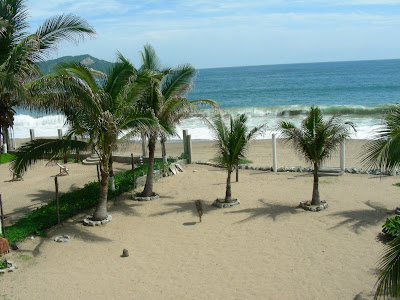
The house. That was the reason for this trip. Of course, I wanted to see if I could adjust to the heat and humidity. But what I really wanted to do was to spend a week in the house where I may begin my Mexican adventure.
I knew quite a bit about the house before I left Salem. I knew it had three bedrooms, that the living quarters were on the second story, that the back yard fronted the beach, and that the roof afforded amazing sunset views. I had also seen photographs -- some of which I shared with you.

My first view of the house did not surprise me in the least. It is the white house with the cupola and brown gate. I have already written about gates and walls and the practical reason for them. I should point out, though, that there is a very nice patio on the second floor behind the tree.

This is the view from that patio. Even though Melaque does not have the type of neighborhoods (or neighbors) where people sit on the porch in the evening greeting all passersby, the patios and sidewalks serve the same purpose.
The interior of the house is very functional. The living room, dining room, and kitchen flow into one another very easily. But, even better, they all flow out onto a floor-length patio that looks right out on the Pacific Ocean.

The house is designed to maximize outdoor living. On the ground floor is a large covered area to park the car and enjoy the breezy shade on hot days. (Good grief! That sounds as if I cribbed it from a real estate brochure.) There is a table and chairs, a wet bar, a bath room, and, most important, hammock hooks. Michael Dickson should ignore the fact that swallows have taken up residence in the garage area. I spent hours watching them come and go.
Every morning I was greeted with this view from my bed:
One of the things I liked about the house was it clean lines. Those lines also made little details seem that much more interesting. Such as the combination of the dome and the grill on the entry door to the roof.
So, what is my overall assessment? I like the house. It felt very comfortable during the week I was there -- even though it really heated up whenever the ocean breezes died down. (That makes me wonder how the houses just a bit inland from the ocean survive without the steadybreezes.)
I now need to work out the details of living there next year. And if not there, I will need to look for another home to begin the journey.
Before I summarize this trip, we will discuss a few odds and ends that did not fit into any of the other topics.













































